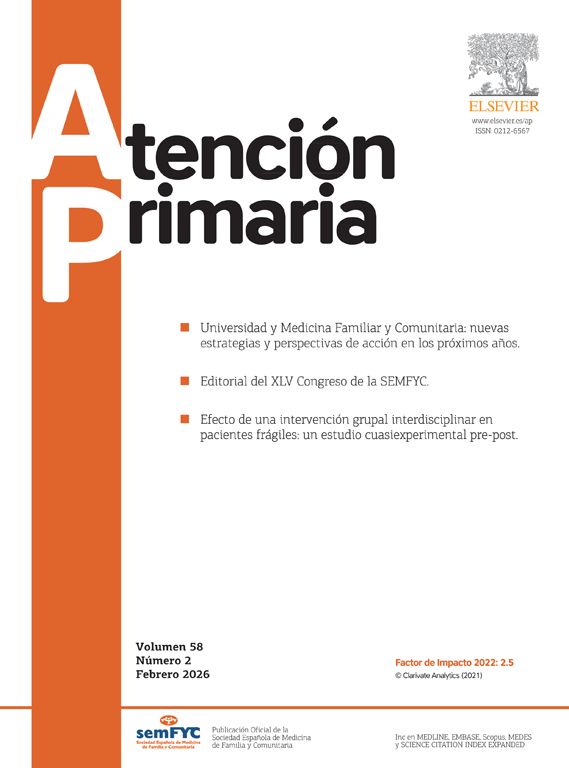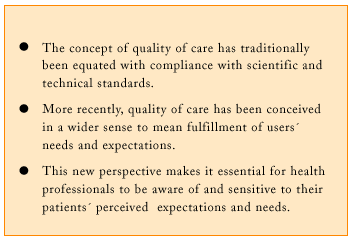Avedis Donabedian described quality of care as that type of care which is expected to provide the patient with the greatest and most complete well-being, once the losses have been balanced against the gains in the outcomes.1 Using this definition as a starting point, we can define the concept of quality in the context of primary health care by answering the question «What requirements should services provided at primary health care centers meet to lead to the user´s well-being?» However, we must also inevitably consider who should answer this question.
Recent years have seen a change in the approach to this topic. Traditionally, we health care professionals have decided what is best for patients, on the basis of our experience and knowledge. Even today there are many professionals who believe that quality service understood broadly can only be provided if physicians' acts are based on the scientific and technical norms and standards of our profession. However, the view that this is only one of the dimensions of quality obviously necessary, but not always sufficient that can be used to fulfil the needs and expectations our patients feel is increasingly widespread.
From this new perspective it seem obvious that the user is the essential protagonist in providing information on characteristics of health care that influence the maximization of potential benefits to be obtained, among which is, undoubtedly, satisfaction with the care received. In fact, several studies have shown that research based on the opinions of professionals is limited in what it reveals about those aspects of health care that users most appreciate. For example, in the study in this issue by Hernán García et al, health professionals offer a wide-ranging yet partial description of the components of care perceived by the user. The information provided by the physician, a habitual and particularly relevant component of quality as it is perceived by users,2 is not identified as such by practitioners. Moreover, another study that investigated a similar issue found that primary care professionals identified their patients´ expectations-especially the most relevant ones such as continuity of care by the same physician and providing an effective solution to the problem that led the patient to seek medical advice more clearly than did their colleagues at hospitals. However, primary care practitioners were less adept at identifying other aspects of treatment and individual attention, which are less relevant for users but that also influence their satisfaction.3
As a result, it seems essential for health professionals to be aware of, understand and sympathize with the user´s point of view in order for the quality of health care to improve.3 The increasing frequency of efforts aimed at incorporating the user´s perspective into definitions and evaluations of quality of health care should therefore come as no surprise.2
Some studies designed to this end have been limited to using a questionnaire as a quantitative approach to research. However, this procedure may be appropriate to determine the relative importance of a predetermined set of possible expectations and needs, but is in itself insufficient to identify the wider range of dimensions, components and factors that make up reality. In this regard, qualitative research methods are particularly useful, as illustrated by the study by Hernán García et al. Such studies shed light on the «what» and «why» of the phenomena under investigation.4 Although now being encouraged4, and although they have been shown useful for designing surveys to measure satisfaction with primary care,5 this type of study has yet to be widely used in the Spanish setting.
Two other studies done in the primary care context are also noteworthy for their attempt to reconcile the viewpoints of the family physician and the user. The first study, of a theoretical nature, resulted in the publication by the Catalonian Society of Family and Community Medicine of a manual titled On the other side of the table. The book contains a series of narratives and commentaries that describe the experiences of different patients, and which form the basis for a description and analysis of the dimensions of perceived quality in the SERVQUAL model (responsiveness, reliability, tangibles, empathy and assurance).6 The second study, of a more practical nature, was done as part of course work for a doctoral program. Physicians visited their general practitioner as patients, and then completed a semistructured questionnaire on the quality of care and reported on characteristics that should be improved.7
To sum up, as noted by J.R. Vázquez, «an excellent doctor is a doctor who, in addition to possessing a great "clinical eye," possesses a great "human ear" which he or she uses to listen to the needs patients feel, and to identify, among them, their real care needs.»







